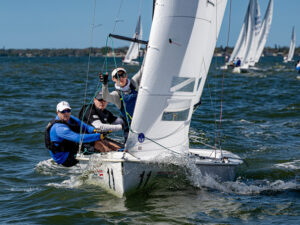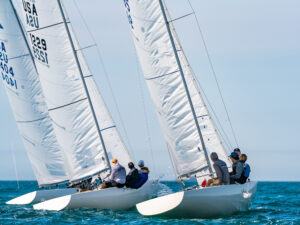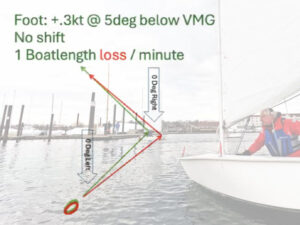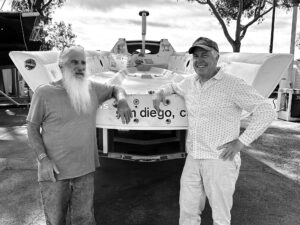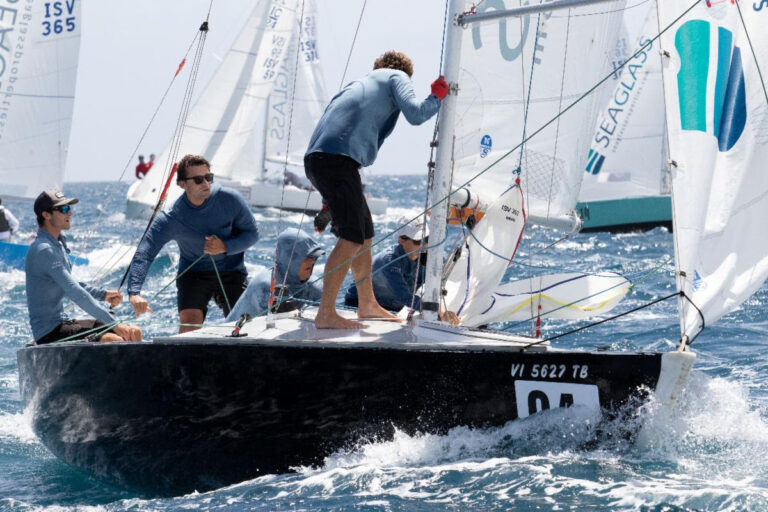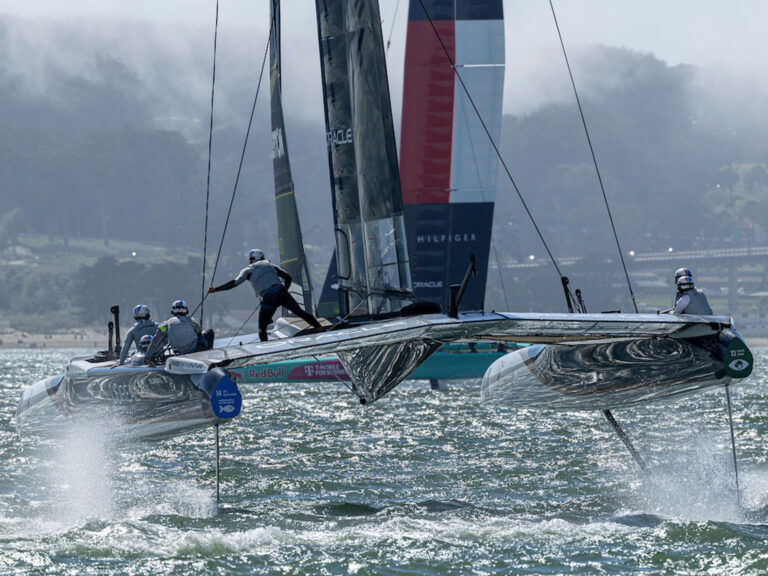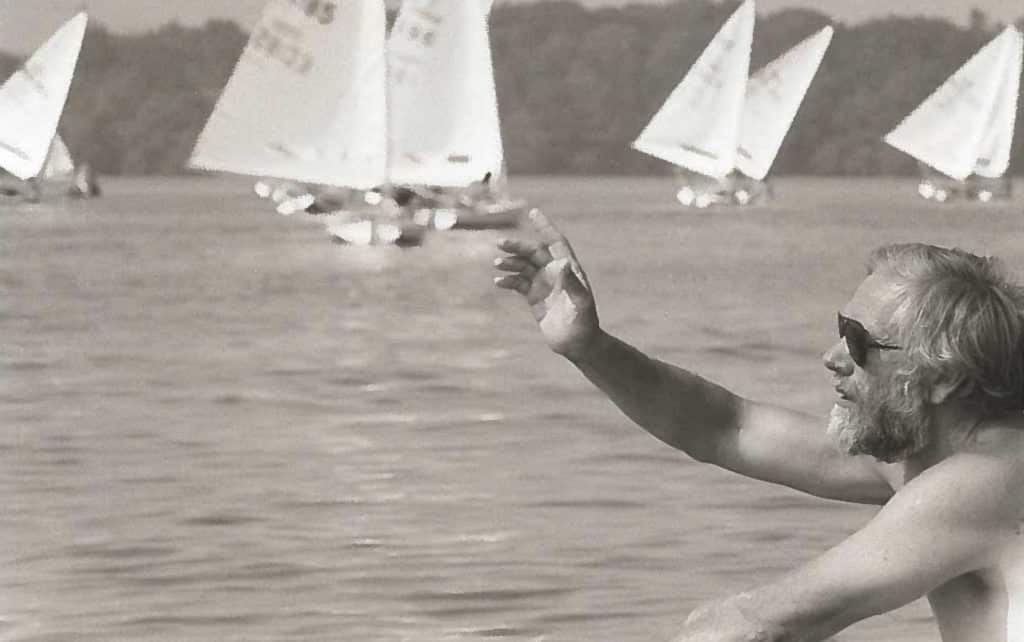
Paul Elvström has won four Olympic gold medals and eight world championships in five different classes. He has designed racers ranging from two-person trapeze boats to Two Tonners, and recently designed a 21-foot singlehander with a sliding seat for those, who, like himself, still want to sail and race alone, but are “less agile than they used to be.” His sailmaking insignia, the Elvström crown, appears on sails in a wide range of classes throughout the world, and there are very few sailors who are not familiar with his name.
In fact, when Elvström talked about his preparation for a championship, he became adamant and intense.
At 51, Elvström is extremely fit, with an immense amount of energy. His English is relatively good, but when he can’t find the words to express his thoughts, he more than makes up for it with elaborate hand and body gestures. He loves to laugh and he was extremely comfortable with all the sailors participating in the Ontario seminar.
During the week of instruction, other attributes surfaced, relating directly to Elvström’s racing ability. He is extremely intelligent, and in an intuitive way, he’ll know that something should or shouldn’t work, often without knowing why. Over the years, his physical conditioning has been without equal, and when his athletic prowess has combined with his intuition and cleverness, Elvström’s truly awesome sailing abilities emerge. For instance, his strength was a vital companion to his seemingly innate mental powers when he skippered a 505 from the wire to a world championship, figuring correctly that his weight would place more tension on the forestay and produce greater speed.
He is obsessed with perfection, and is downright impatient with anything less. During the training week, after watching a boat sailing upwind get struck by a puff and heel momentarily, Elvström jumped up and cried, “Oh, no. This is bad. You must keep the boat flat all the time.” And it was obvious that he made the same kind of demands on himself during his own training. In fact, when Elvström talked about his preparation for a championship, he became adamant and intense.
To him, the preparation was more important than the actual sailing, because at the uppermost levels of completion, he claimed, most sailors could race well, but there were often huge differences in the amount and quality of preparation each performed.
By the end of the week, the message came through as to which has become great, and why so many of us fail to reach our own full potential. Quite simply, Elvström set for himself the highest possible standards of excellence and then worked extremely hard to reach them, trained and sailed eight hours a day and worked nights for income, continually thought out ways to improve his boat, his sails, his equipment and himself.
As a result, he has become what some consider the greatest sailor in the world, and has gathered as much sailing experience in his one lifetime as most would gather in ten. What follows are some of his philosophies and thoughts on various aspects of racing, derived through a startling career as athlete, sailor and, ultimately, as master.
“Why Are We Here?” I think during the time here, the most important thing is that you try to know each other; that way, you are smiling and happy and you like to be together. I think that what you will learn here you all know before because you are good sailors; but you can teach each other and become very good friends, because after this training week you should go back and play yachting, play racing with each other, because that’s the only way to be good. We like sailing. We like to compete. We like to play. If you are playing in a group where you live, you will automatically be very good because you will teach each other. You’ll go out. Racing because you love it, and I think this is the most important thing.
“You Are Fair”
Here is an important idea: If you are fair and a nice man to everybody, they will accept that you are first; if you’re not, then nobody will accept you are first. So it’s much easier to be first if you are nice. Let us say for instance, starboard/port. If the port is a little close to you, let him sail past you, because you shall pass him if you are better or you are faster. If there’s doubt, let him go, because this man, he will always accept that you will beat him, because he felt you were so fair. And another thing. In a regatta, some people are crying, “Starboard!” Why? It’s unnecessary. The man on port is not stupid. He knows that you are there. So it’s nice to compete with people who are not using a big mouth.
“We Shall Not Be Nervous”
We come to a big regatta and there’s a skippers’ meeting, and everybody sits there with the rules, and they’re so nervous; and I’m always hoping that there would be a member of the committee who would break this, and try to make even important events fun—everybody smiling and looking forward to going out and competing in the boats and being nice against each other. And when you enjoy yourself sailing in that way, you are sailing much better than when you do something to make yourself nervous. Remember, we are sailing for fun. That’s why we’re here. We shall not be nervous. That’s my experience in my life in yachting.
“Only When You Are 100 Percent”
The preparation is the most important thing, because only when you are 100 percent sure you know everything and have forgotten nothing are you racing, and you can concentrate on starting in the right place and using the tactics. Remember this formula: P6 = Proper Prior Preparation Prevents Poor Performance.
The important areas are the physical conditioning, boat preparation, and the racing rules and tactical ideas they give you. Also, when you come to a regatta, look down the list of entrants, review the strengths and weaknesses of the ones you know and find out about the ones you don’t. Because when you come to the start you know what they are used to doing, and if they’re used to being wrong you know it. And you can calculate that they can be a little stupid sometimes, like falling down into you at the start, or they don’t respect the rules. And I never try to fight against people who break the rules; I try to get away from them at an early stage.
“My Compass Headings”
To calculate where the wind is moving before the start, I begin sailing upwind once I am near the course area and notice my compass headings. I might notice that I was pointing one way for two minutes, then l was pointing lower, etc. So I know what are the high compass direction, and the low. Then I say the highest we had three-quarters of the time, the low for one-quarter of the time, and from that l calculate an approximate median. Whenever the wind changes, there is a good possibility that it will come back, unless there’s an obvious reason why it won’t. For instance, the starboard is very high, so I stay on starboard because there is a very good chance it will go back.
As the race progresses, and I’m behind, I will use the other boats to tell me when I will get the wind shifts, and take the benefit of them, because sometimes people bear away in headers and wait a little to see if they will stay, and that helps the boats behind.
“Sail Your Own Tactics”
Once you have started and are sailing upwind, and the boats begin to tack away, it is most important for you to sail your own tactics. If you see that you won’t gain by tacking, don’t tack. Only tack when you see that you are gaining. If you tack just because others are, then you are only following, waiting for them to pass you. If you are in a good position, why not try for a better one. I see too many good sailors following each other around. Let’s say you have calculated an 80 percent chance of becoming headed, that is, there is a chance that you won’t become headed. You must continue on and carry out that tactic. You must not be weak and say, ‘I think its better to follow the fleet.’ Because you are not the winning type, you are the careful type. And the careful type is never the winner because of this.
“Keep The Speed”
Here is another important rule: When you are sailing upwind and you feel you cannot point as well as you’d like to do, then keep the speed. If you get a header, bear off and keep the speed -speed, speed, and speed. And then if you see the advantage by tacking, tack, and always keep the speed. And when you have bad luck, or when you are on your own, don’t try and point the boat too high or force the wind. Bear off and think, speed, speed, speed. And if you stay calm and work hard, you will go fast and point well, and soon you will have good luck, too.
“A Favorite Wind”
A storm. I love the water in a storm. I like nature. I like all winds. I enjoy the change, but I especially like strong winds, especially with spinnaker. I pull on my vang and let my sail all the way out. Pulling in my sail would hurt me because I know I would be losing some speed. But you must practice to get confidence.
“Tack Without Losing Speed”
When to tack if you get headed depends on the position of the racecourse. If the header is slow, then wait for the wind to go back to the median and tack. If it is quick, then you will want to tack immediately. That is why it is very important to be able to tack without losing speed. If you can’t tack without losing speed, you can’t take proper benefit of the shift.
“Good Fast People”
If there are good fast people in front of me on the reach, then I will follow, but if it is people I can easily pass by planing, I will go up. But I will wait until they are in a bad position and slow, so they won’t luff me.
“I Sail With Only a Tiller”
I cannot feel the boat with a wheel. If all you had to do was to sail with your eyes, anyone could do it. You must also use all your feelings; the wind on your face, the palm of the hand, the sensation of the boat. I cannot sit to leeward. Then, you can only see the sail. You must always steer to the waves, not follow the sail.
When tacking, roll the boat hard. The sail should luff just once, when it goes from one side to the other. Cross the boat like a cat, on the balls of your feet, and be very sensitive to the heel. In a jibe, let the sail out 45 degrees, then step and sit down very hard, pumping the sail up against the wind. And with waves, the main thing is that instead of going into a wave, you must pass a wave. If the wave is low you can bear away and pass around it. If it’s high, then you must luff to pass it. The worst thing is to bear off for a wave because we think we can catch it, then we don’t catch it and we slow down more in speed. So if we bear off, we must be sure we can catch the wave. Also, on the reaches, it is much quicker to correct sail trim with tiller than by working the sheet. We have always known that if you take the right benefit of the waves and the boat and the rudders, you can pass someone very soon who is sitting still.
“Know Which Way To Go”
The most important thing on starting tactics is to know which way you want to go after the start. If you want to continue on the starboard tack, do all you can to have free water to leeward. If you want to go onto port, you may have to start one boat length late so that you can be sure to get onto port immediately. Because what is expensive at the start is to go the wrong way. Now, if the line favors the portend, or its even, I will start near the port end, because soon after, starboard tack is usually headed. But if the line favors the starboard end, I can be sure most of the boats will try to start there. Then, I position myself to leeward of the group because even though I’m behind at the start, I quickly get free wind, and if it turns back a little, I get more free wind, and finally it goes back more and I can tack and cross ahead of the group. This is instead of taking the chance of getting the best start but getting forced into a very bad start or being forced to tack immediately.
“I Am Happiest When I Am In a Boat”
That is the reason I go out sailing as much as I can. I feel well in a boat and if I’m not sailing, I don’t feel well. That brings me to a very good point. Now you are all young, but young people can have problems, too. And if you have problems — business, education, family — give up racing because you will be bad. Because you cannot really concentrate on the race. And I have seen so many friends, who are very good, but they went into a divorce, and they were hopeless on the racecourse.
They were not concentrating on the race, but thinking about how bad everything was. And I went into business problems, and I knew I was out of racing, and I love racing, but I was bad. I couldn’t concentrate, my preparation was poor. I didn’t work hard enough, and yes, when the race started I gave everything I had. But I knew I had lost before I started. I then get angry at myself when I make a mistake I should have seen, because I like to do it perfect. If I lose because of bad luck, then I don’t do anything, but if I lose because I have been stupid, then I’m angry.

